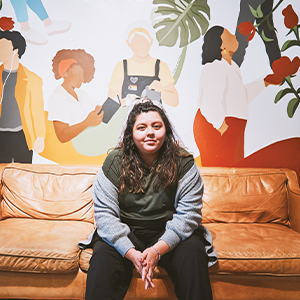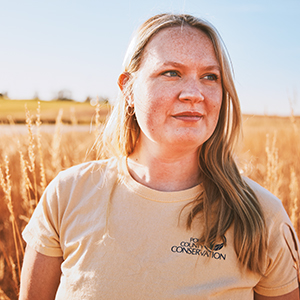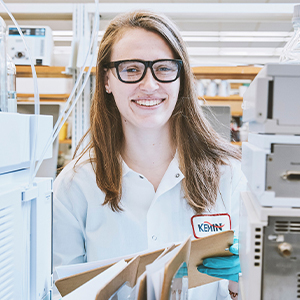Writer: Brianne Sanchez
Photographer: Joe Crimmings
Spend time chatting with the next wave of local leaders and it’s clear that society’s stock question for youths—“What do you want to be when you grow up?”—is losing relevance. For today’s 20-somethings who had pivotal coming-of-age years disrupted by the pandemic, the chance to continue to explore new opportunities and connect is critical.
What does the future hold for them or the city? Nobody’s claiming to have it all figured out; instead, they’re focused on building a supportive community for the journey.
Emmett Phillips
The Storyteller

Emmett Phillips works as a facilitator at Oakridge Neighborhood. He’s also a hip-hop artist, poet, teaching artist, and actor. His art promotes equality, social justice and freedom.
Sitting in the Oakridge Neighborhood Variety Center where he works, Emmett Phillips traces his sense of leadership responsibility to his Liberian lineage. Although he attended Des Moines Public Schools and graduated from Valley High School, Phillips, 29, credits his parents’ cultures and expectations with instilling in him ideas about the importance of service.
“I have a mix of family bloodlines that were essentially in conflict over there, based on the politics of Liberia,” Phillips says. Tribal traditions on his father’s side and mining wealth on his mother’s meant their upbringings were different, yet both parents started contributing to their communities early in life.
Newspaper clippings Phillips has spread out capture some of the highlights from his own journey. In one, from a 2018 Des Moines Register Storytellers event, Phillips shares how his career aspirations to serve as a military medic shifted after a government shutdown halted his scholarship award. The pause in funding helped him realize he wanted to focus on making art.
“I want to inspire people about the power of one person, in harmony with their own purpose,” Phillips says. “Impact starts with knowing yourself well enough and experimenting to really find out what speaks to you, and then being rooted by something that’s bigger than yourself.”
At 19, Phillips stepped into his first role with the Boys and Girls Club as a youth development professional. Over the past decade, he’s worked with various youth and community development nonprofits, where he’s blended his facilitation and motivation skills with his talents as a poet, dramatist and hip-hop artist. Oakridge’s 2020 “Success Is My Protest” music video is just one example of his purpose in action.
“I have exactly 10 years of going hard and incrementally adding more to my toolbox and increasing my impact,” Phillips says. “And I’m just beginning.”
Phillips aspires to perform in and learn from communities outside Central Iowa, but his hope is that the future of Des Moines is oriented at ensuring people can make a living here doing what they love.
“My main thing for humanity is the same thing I want for Des Moines,” he says, “which is proper support for people that are in their purpose, doing work, so they don’t take their brilliant, hardworking selves and go to all these other places, leaving Des Moines devoid of talent and ingenuity and raw creativity.”
Marissa Hernandez
The Visual Artist

Muralist Marissa Hernandez paints faceless portraits, such as this graphic backdrop at Slow Down Coffee Co. in Highland Park.
If the walls Marissa Hernandez has painted around Des Moines could talk, they might share a few thoughts from the artist’s point of view. Hernandez, 24, posts her work as @marissa.monstera on Instagram, a platform she also uses to amplify the work of fellow diverse artists, creatives and entrepreneurs. A graduate of Southeast Polk High School, Kirkwood Community College and Drake University, she reflects on launching her career in Central Iowa.
On changing majors from actuarial science to art: “It was a big thing, because my dad’s an immigrant from Mexico and he and my mom never had a lot of money growing up. A lot of the reason I chose actuarial science was because I wanted something that guaranteed a high-paying salary so I could take care of them and they wouldn’t need to worry. It was kind of nerve-wracking, switching to painting, because obviously it’s not guaranteed that you’re going to get a well-paying job or even a job at all. It meant a lot to me that they were super supportive.”
On her signature faceless portraits: “It wasn’t until towards the end of my two years [at Drake] that I started to figure out what I wanted my art style to be about. I was drawn to portraits, and my professor suggested that I paint someone that I know or someone meaningful. I started developing the faceless portraits so I could do a lot of different body types and different hairstyles and cultural clothing, which was important to me. My big thing is that it didn’t matter to me who my portraits were of, specifically, if the piece can make someone feel seen or represented.”
On receiving studio space at Mainframe Studios rent-free for a year after graduation: “I feel like it helped a lot with networking and for people to take me more seriously. I no longer have one [studio space] because I can’t really afford that kind of rent, but it was super great to help me get started.”
On competition versus collaboration: “I’m a homebody, but I think it’s super powerful to connect with people online. I am friends with a lot of other BIPOC artists, and it’s nice to talk about the issues we face and share our stories and uplift each other. Jill Wells is someone I’ve worked with a lot. We did the Evelyn K. Davis mural together. She designed it and brought me on board to help her complete the mural and paint it.” (Read more on Wells and the mural here.)
On setting rates and knowing her value: “Art is subjective, and it seems like people want to haggle [over] prices for creative work like they wouldn’t with a mechanic or a plumber. I’m still navigating it and sometimes it is rough. I’m a professional, even if I don’t look like a traditional professional.
We see white artists in Des Moines get a lot of opportunities that we just don’t get and get paid a lot more for [their work]. … It seems like we [diverse artists] have to advocate for ourselves a lot more. Sometimes we just want to create without having to convince people that we’re worth it.”
On building a thriving creative economy: “If Des Moines wanted to be culturally forward, we easily could do that because we have such great small businesses and creatives. I think it’s just about the people of Des Moines being more intentional about how they spend their money. It’s not just supporting people with words, but with actions. It’s putting your money where your mouth is.”
In addition to the Evelyn K. Davis Center, some of the murals Hernandez has worked on can be found at Slowdown Coffee Co., Art Terrarium, Joujou (a children’s play space), Comigo Early Education Center, Findley Elementary School, and the Gregory and Suzie Glazer Burt Boys and Girls Club.
Ahmed Musa
The Facilitator

Originally from South Sudan, Ahmed Musa works in restorative justice for Des Moines Public Schools.
We caught up with Ahmed Musa, 23, as students streamed into Roosevelt High School. The former Simpson College basketball student athlete studied interactive media. Now he’s on the team that’s bringing restorative justice methods into Des Moines Public Schools. While his classroom was still quiet, Musa shared more about the opportunities he sees in this role. In his words:
My family is originally from South Sudan; I came [to the U.S.] in 2000. I’ve lived in Des Moines for most of my life. I grew up around Evelyn K. Davis Park.
Helping others is just a passion [of mine]. I remember one time we were at the park and some little kid had on, like, size 13 shoes because he didn’t have any of his own. So I took mine off and gave them to him. I used to be a giant sneaker head. I had around 50 pairs of shoes. But then I realized I could give away those 50 pairs, and now 50 people could have a pair of shoes. So I gave away all my shoes and when we ran out, I posted a flyer and it became like a yearlong shoe drive.
I’m only five years removed from high school, so [students] can see someone that looks like them in the hallways and in the classroom who’s done everything they wanted to do—whether that be to go to college, play college basketball or even start a business.
Last year was my first year being a restorative justice facilitator. I was trying to set boundaries because most of [the students] knew me [as a peer]. When there’s issues, we try to undo that harm. We create interventions and do a lot of restorative circles. Within the circle, we have a talking piece; most of the times it’s a ball. Everyone goes around, we ask them, “Why are we here today? Explain how you feel about the situation.” And then we ask, “What could have been done?”
Izaah Knox and Dwight Jackson [with Urban Dreams] have been my mentors and helped me learn and grow as a facilitator here at Roosevelt. We also run Summer City Hoops, so I’ve learned how to supervise and coordinate things.
My vision for kids younger than me is to see what I’m doing and be inspired. I’m not purposely trying to create inspiration. I just want to have fun and be successful and open up doors for other people.
Lindsey Page
The Naturalist

Lindsey Page helps connect people—especially kids—to the outdoors as a naturalist with Polk County Conservation.
Loading dozens of fourth graders into canoes at Jester Park is just one of the many duties Lindsey Page assumes as an assistant naturalist for Polk County Conservation. At just 25, she’s already amassed more than a decade of experience connecting people with the outdoors, so spending the morning facilitating a field trip is a literal walk in the park.
“My favorite age group is probably the littles, just because they’re so responsive to everything you say and everything is cool,” says Page, who grew up on a llama farm in Maxwell and spent her teen years through college working and then managing a team at Center Grove Orchard in Cambridge.
She started her studies with a goal to become an elementary music teacher, but an environmental science class at DMACC’s Ankeny campus inspired her to change course. Page wound up majoring in forestry and animal ecology at Iowa State University, then landed an internship with ISU Extension and Outreach programs called Water Rocks and Iowa Learning Farms that blended her interests.
“I was meeting farmers across the state and learning about the different conservation practices they were using, like prairie strips,” Page says. “I’m a farm kid at heart, so to see farmers who are understanding that turning land back into prairie or wetland can actually give them more profit and have their yields go up was really cool, as someone who loves nature but also loves my farmer dad.”
Working with community members from pre-K through senior citizens, Page sees huge potential in county parks bridging the urban and rural divide. Her pandemic-era internship has also inspired her to embrace the potential of virtual experiences to expose new audiences to conservation content.
“I was able to do my own YouTube series called ‘Simple Science,’” Page says. “I was also part of a puppet show, Mr. Rogers-style, called ‘Harmony Brook Watershed’ to teach preschool through kindergarten all about different topics in nature.”
Exposure, Page believes, is key to getting people to care. The team at Polk County Conservation hosts outdoor yoga and forest bathing for adults, too. (A term that originated in Japan in the early 1980s, forest bathing is a practice that encourages people to spend time in nature to rejuvenate both their physical and mental health.)
“There are so many benefits to getting outside and enjoying nature,” she says. “It’s about sparking that joy while they’re out here.”

Laura Hamilton
The Scientist
As Central Iowa cultivates more innovative science, technology and agricultural companies, opportunities are expanding for recent graduates to develop their careers. Native Minnesotan Laura Hamilton, 25, a research associate at Kemin Industries, moved here after graduating from Luther College with degrees in biochemistry and management.
Hamilton focused her job search in the Midwest. “It was [the height of the pandemic] when I was job searching,” she says. “I was going to be moving to a new city and be in isolation, essentially, while I was learning a new job, so I wanted to have resources close to me to keep myself sane.”
She landed in Kemin’s Nutrisurance division, working in a lab to develop the flavor components that go into dog and cat foods. It’s an interesting twist, considering Hamilton once thought she’d pursue veterinary science. She’s still working in a way that affects pets and their families but leaning into the problem-solving aspects of research and development.
“By itself, kibble is pretty dry and not very tasty because it has all the nutrients that your pet needs,” she says. “My role is looking at what ingredients we can use to make it both healthy, cost effective and tasty.”
For nearly the first year of her career, pandemic protocols made in-person connection with colleagues difficult. So the former college athlete turned to sports to connect with her new community.
“It was hard to join things at first, because COVID was a huge deterrent,” she says. Joining an intramural soccer league helped keep her active and make new friends. “We also have a work sand volleyball team. It’s Ph.D.s and smart people who don’t always have athletic prowess, but we have a lot of fun competing at the beginner level.”
Hamilton is looking forward to the new Topgolf opening in West Des Moines and excited about the possibilities the pro soccer stadium can bring. She believes attracting more young professionals to Central Iowa should be a priority, and in her mind active lifestyle amenities are a way to keep them here.
“Having the High Trestle hiking and biking trail right near my house helps a lot,” she says. “Any chance to do a physical activity is definitely a plus for me.”










